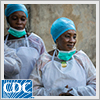Podcast
Voice of America Interview on Global Health Security With Dr. Hamid Jafari

Global health security progress in Africa. Created: 11/7/2017 by Center for Global Health (CGH). Date Released: 11/7/2017. Series Name: CDC Featured Podcasts.
Press Play to listen to this CDC Podcast
Voice of America Interview on Global Health Security With Dr. Hamid Jafari
Transcript
Voice of America Interview on Global Health Security With Dr. Hamid Jafari
[Announcer] This program is presented by the Centers for Disease Control and Prevention.
[Adam Phillips] The Global Health Security Agenda uses four strategies to fight infectious diseases. And a recent Centers for Disease Control report shows those strategies work.
Dr. Hamid Jafari, the principal deputy at the CDC’s Center for Global Health, says it starts with rigorous surveillance to rapidly identify outbreaks. Next, he says, laboratories must be able to quickly test patients to find which illness is in play. The third crucial element is a trained workforce of disease detectives…
[Dr. Hamid Jafari] …who can actually identify outbreaks and patterns of diseases as they start, early on. They can do a risk assessment, do data analysis, who can actually analyze surveillance information so that they can then plan for control measures.
[Adam Phillips] Finally, Jafari says a coordinated emergency response and management plan needs to be in place. It should include, among other elements, treatment facilities, health workers, the agricultural and transportation sectors, and an integrated national and international response.
The CDC partners with 31 countries in the Global Health Security Agenda, 16 of them in Africa, to implement those four strategies.
Jafari points to the current outbreak of pneumonic plague in Madagascar, where the CDC lends crucial support, as evidence of progress.
[Dr. Hamid Jafari] So right now, in Madagascar, we have plague experts and scientists who are working with the WHO and the government of Madagascar and other partners to understand the scope of the outbreak, to make sure that the diagnostics and the way the contacts of cases tracked and identified, while being implemented at the border control is in place, and we have epidemiologists who are working closely with public health authorities in the country.
[Adam Phillips] In Liberia, surveillance, disease detective work, and rapid diagnostics paid off. In April, several people who attended a funeral became ill with symptoms that experts feared might be the Ebola virus or Lhasa fever. But…
[Dr. Hamid Jafari] …they were, within days, able to diagnose this with support from CDC that this in fact was a meningococcal disease outbreak. And so they were able to again, identify close contacts immediately, provide antibiotic to the close contacts— to about 200 hundred of them—and the outbreak was immediately stopped.
[Adam Phillips] Jafari says the strategy improved outcomes in Uganda. When Marburg virus popped up there last month, the local and international response was immediate. This contrasts sharply with the country’s experience during a major cholera outbreak in 2013, when it took 40 days to mobilize resources.
[Dr. Hamid Jafari] This Marburg virus is the most recent example of how quickly they detected these cases and how quickly they mobilized and quickly analyzed the information that who was the index case, who were the close contacts, infection control measures put in place. Then the CDC country office in Uganda and our experts from Atlanta got involved and supported the national response. So the sea change is incredible.
[Adam Phillips] The team at the CDC Center for Global Health hopes there is growing recognition that it’s far less expensive, both in terms of human suffering and finances, to identify outbreaks early before they become international threats.
Jafari, however, acknowledges that ramping up capacity throughout Africa will mean painstaking work that must be done, in his words, “brick by brick.”
Adam Phillips, VOA News, New York.
[Announcer]For the most accurate health information, visit www.cdc.gov or call 1-800-CDC-INFO.